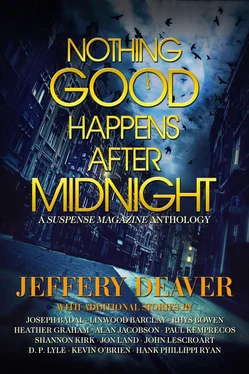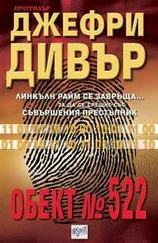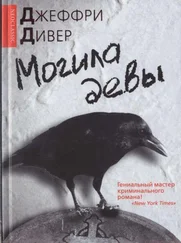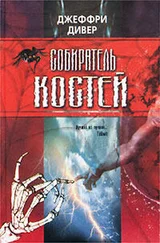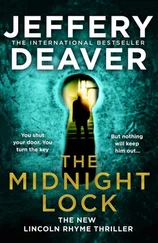Then there was a pause. “Fred, no! He’s in the front yard. He’s got a knife! Get back here. Fred? Now!”
Beth heard a shrill scream. The line went silent.
The police were at the house when she arrived. Beth skidded the car to a stop, half in the driveway, half on the lawn.
Two men — both pale-complexioned, one round, the other tall and balding — were on her doorstep. They wore nearly identical suits, navy blue, and white shirts. Gold badges rested on their belts. She jogged to them, breathless from the run and breathless from the shock of what she’d learned had happened.
She stared at the Altman house. The medical examiner was wheeling one body out. That would be Sandra’s; Fred had been slashed to death in the front yard.
Crying softly, Beth asked the stocky detective where her husband was, and how was he?
“He’s in custody, Mrs. Tollner. We found him walking down the street, about three blocks from here.”
“He was holding the knife. The murder weapon.”
She dabbed her eyes and thought of the people she’d have to notify: her parents, Robert’s. His sister, too, and her husband, Joanne and Edward, the only relatives who lived nearby.
“Is he — was he hurt when you arrested him?”
“No,” the tall officer said. “Looks like, according to the arresting officers, it was like he was sleepwalking. Muttering and humming to himself. He was read his rights but he didn’t acknowledge understanding them.”
His partner: “Mrs. Tollner, does your husband have any history of mental illness?”
Through her mind streamed images of the incident from last night, her discussion with the psychiatrist. It occurred to her that maybe she shouldn’t be answering their questions. Wasn’t there something about a privilege between husbands and wives?
“I think I’ll talk to our attorney,” Beth said evenly.
“This is a very serious crime,” the heavy-set officer said.
Her look was essentially: And you need to remind me why?
“It’ll go a long way for Robert, if we get cooperation. From all parties.” That was from his partner.
Was this good cop/bad cop? Beth knew all about that; she had watched many of the true-crime TV shows.
“I’m going to talk to a lawyer.” She looked defiantly from one to the other.
“That’s your right.” This was from the one she thought was the bad cop. Maybe they had swapped parts.
When they were gone, she went inside and stepped into the kitchen to make some coffee. She stopped abruptly. Robert had removed four sharp knives from the wooden blocks and arranged them carefully on the green granite island. They appeared to make a pattern but she couldn’t find any meaning.
She started to put them away but then thought maybe the police would get a warrant or ask her if she’d moved anything. She left the blades where they were.
In the spacious living room, Beth dropped onto the couch and placed a call to a man named Julian Kramer. He was a criminal lawyer with one of the biggest firms in southern Connecticut, and she’d been given his name by Robert’s sister, Joanne, who like her brother was also an attorney, though the woman did no criminal work.
Kramer had been expecting the call. He listened patiently and told her his fee structure, which she instantly agreed to. He asked a number of questions. She sifted his words for clues as to whether or not he was hopeful for Robert, but she spotted no tell.
Then thought to herself: given the facts, how much hope could he offer?
Was there any doubt her husband had stabbed to death two people he despised?
“Give me the names of the detectives,” the lawyer said. I’ll call and see what the booking plans are. If he’s in an unstable mental state, there’ll be a different set of procedures.”
She did this then hesitated. What did she want to say? Do your best. Please help. You have to understand he’d never do anything like this.
Except he had.
“Anything else, Mrs. Tollner?”
“Does it look hopeless?”
Now the lawyer was the one pausing. “We’ll probably need to be creative in crafting our defense. I’ll be in touch.”
Creative. What did that mean?
She then took a deep breath and began making calls to the family.
They were, of course, difficult — impossible conversations, largely because she had no answers to the rapid fire and frantic questions friends and family and co-workers of Robert asked.
She then called the jail and learned that Robert was still in the prison hospital. He remained unresponsive. He wasn’t able to talk to anyone. He was, however, still compulsively humming.
Beth disconnected and slumped on the couch. A moment later she sat up, as if jolted from a nightmare.
She’d been thinking of the four notes Robert had been humming in repetition. She realized she’d gotten the order of them wrong, starting with what would have been the third, not the first note. Not A-D-D-E.
What Robert was really humming was “D-E-A-D.”
The bell rang and Beth opened the door to admit Joanne Post.
In the driveway her husband, Edward, a lean, handsome man of around forty, sat in his work truck, JP Designs stenciled on the side. He owned a landscaping company.
Beth waved to him. The couples had been close for the past year, ever since Joanne and Ed had moved here from Virginia. He waved back.
She closed the door and the two women walked into the living room. Robert’s sister was a tall, lanky woman, a lawyer for a firm that did environmental law. Her salt and pepper hair was cropped short. Joanne was an avid runner and today she wore orange athletic shoes, as well as jeans and a navy sweatshirt.
The women embraced and Joanne wiped a tear with her index finger.
Beth adjusted a log in the fireplace — she’d found fires comforted her at frantic times like this. Joanne sat on the couch next to the crackling blaze and warmed her hands. Beth brought in mugs of coffee.
The sister asked, “How is he?”
“The doctor, from the jail? He called. He was nicer than I thought he’d be, I mean, he’s also a guard, when you think about it. He said Robert’s still in some kind of fugue state. He told me they don’t use the word ‘breakdown’ anymore — it’s not specific enough — but it fits in Robert’s case since there’s no particular category they can put him in.
“What do you know about the insanity defense?”
“I do real estate,” Joanne said, shrugging.
“But from law school? You must remember something.”
Joanne looked off. “I think it’s that you can’t be tried if you didn’t understand the nature of what you did. Or if you can’t participate in your defense.”
She added there would be motions for a mental evaluation. A doctor picked by them, one picked by the prosecution, and a judge-appointed third psychiatrist. This would take some time. “Are you thinking of insanity for Robert?”
“This is going to sound strange at first, but hear me out.”
She told Robert’s sister about the curse of the Midnight Sonatina — the composer’s murder of the priest and his suicide.
She then went online and found the article she’d been reading earlier, when she got the call from Sandra Altman. The women sat next to each other and read:
The professor returned to London, where a chamber group there added the Midnight Sonatina to their repertoire. It was at one of their concerts that the sonatina was associated with yet another horrific crime.
After the premier performance, one of the concert goers, upon returning home, began acting strangely: it was reported that the man simply stared at his wife for minutes on end and when, unnerved, she summoned friends over, the man went into a rage and he stabbed her to death. He’d complained to friends earlier that he suspected his wife was having an affair.
Читать дальше
